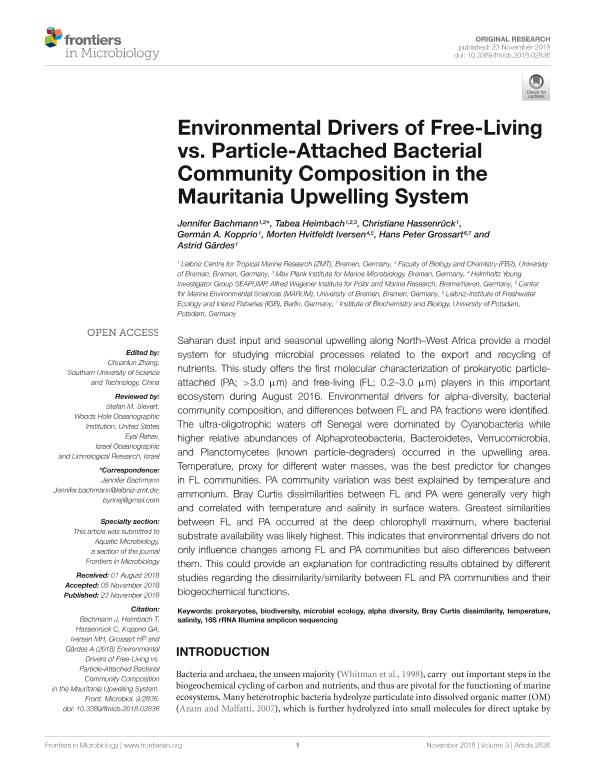Artículo
Environmental Drivers of Free-Living vs. Particle-Attached Bacterial Community Composition in the Mauritania Upwelling System
Bachmann, Jennifer; Heimbach, Tabea; Hassenrück, Christiane; Kopprio, Germán Adolfo ; Iversen, Morten Hvitfeldt; Grossart, Hans Peter; Gärdes, Astrid
; Iversen, Morten Hvitfeldt; Grossart, Hans Peter; Gärdes, Astrid
 ; Iversen, Morten Hvitfeldt; Grossart, Hans Peter; Gärdes, Astrid
; Iversen, Morten Hvitfeldt; Grossart, Hans Peter; Gärdes, Astrid
Fecha de publicación:
23/11/2018
Editorial:
Frontiers Media S.A.
Revista:
Frontiers in Microbiology
ISSN:
1664-302X
Idioma:
Inglés
Tipo de recurso:
Artículo publicado
Clasificación temática:
Resumen
Saharan dust input and seasonal upwelling along North-West Africa provide a model system for studying microbial processes related to the export and recycling of nutrients. This study offers the first molecular characterization of prokaryotic particle-attached (PA; >3.0 μm) and free-living (FL; 0.2-3.0 μm) players in this important ecosystem during August 2016. Environmental drivers for alpha-diversity, bacterial community composition, and differences between FL and PA fractions were identified. The ultra-oligotrophic waters off Senegal were dominated by Cyanobacteria while higher relative abundances of Alphaproteobacteria, Bacteroidetes, Verrucomicrobia, and Planctomycetes (known particle-degraders) occurred in the upwelling area. Temperature, proxy for different water masses, was the best predictor for changes in FL communities. PA community variation was best explained by temperature and ammonium. Bray Curtis dissimilarities between FL and PA were generally very high and correlated with temperature and salinity in surface waters. Greatest similarities between FL and PA occurred at the deep chlorophyll maximum, where bacterial substrate availability was likely highest. This indicates that environmental drivers do not only influence changes among FL and PA communities but also differences between them. This could provide an explanation for contradicting results obtained by different studies regarding the dissimilarity/similarity between FL and PA communities and their biogeochemical functions.
Archivos asociados
Licencia
Identificadores
Colecciones
Articulos(IADO)
Articulos de INST.ARG.DE OCEANOGRAFIA (I)
Articulos de INST.ARG.DE OCEANOGRAFIA (I)
Citación
Bachmann, Jennifer; Heimbach, Tabea; Hassenrück, Christiane; Kopprio, Germán Adolfo; Iversen, Morten Hvitfeldt; et al.; Environmental Drivers of Free-Living vs. Particle-Attached Bacterial Community Composition in the Mauritania Upwelling System; Frontiers Media S.A.; Frontiers in Microbiology; 9; 23-11-2018; 2836
Compartir
Altmétricas



